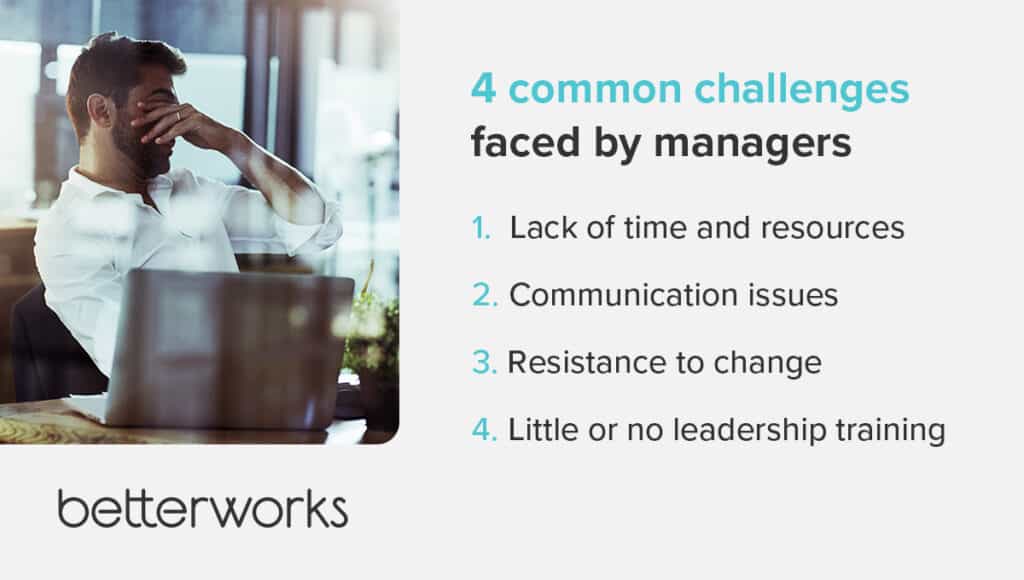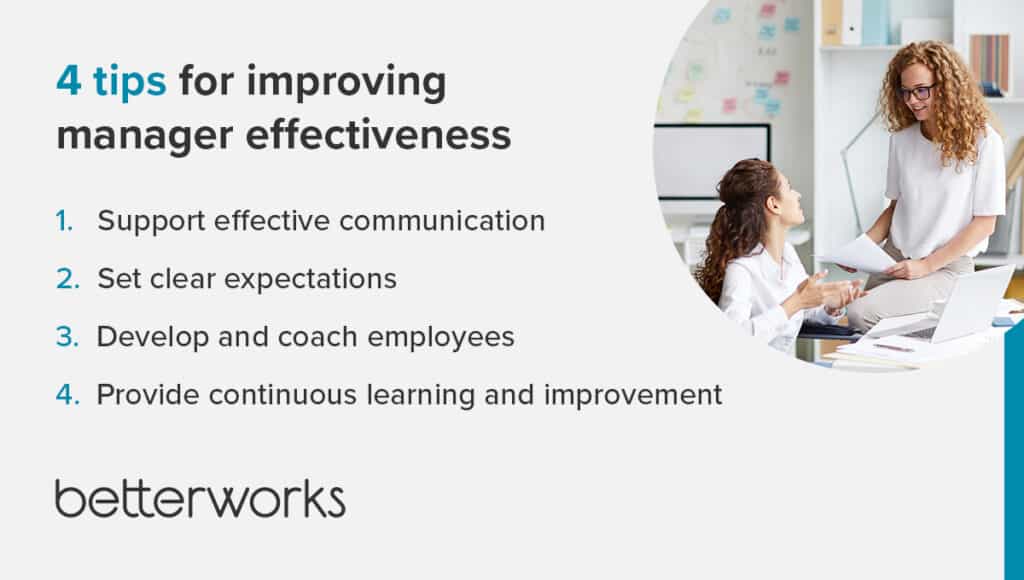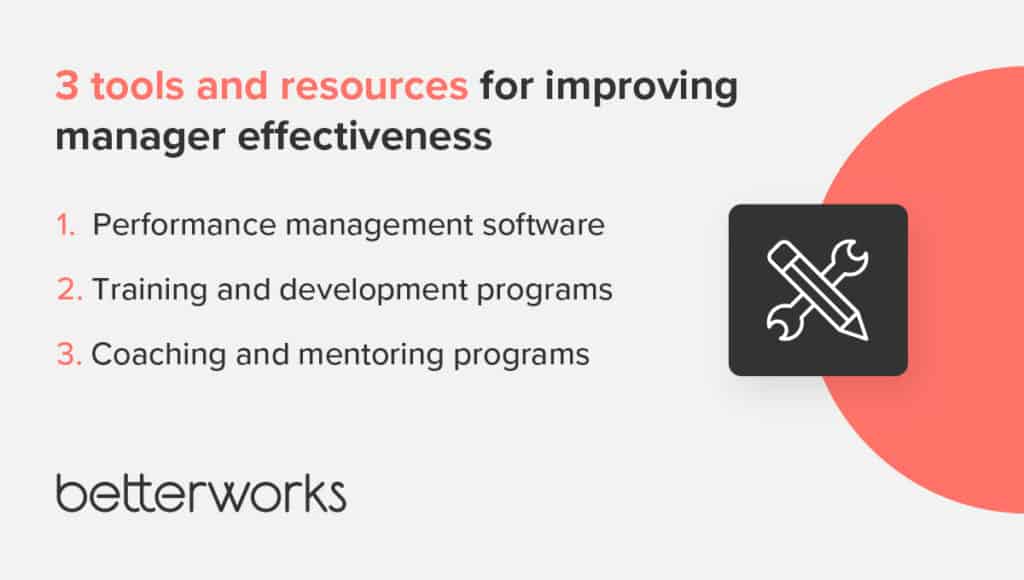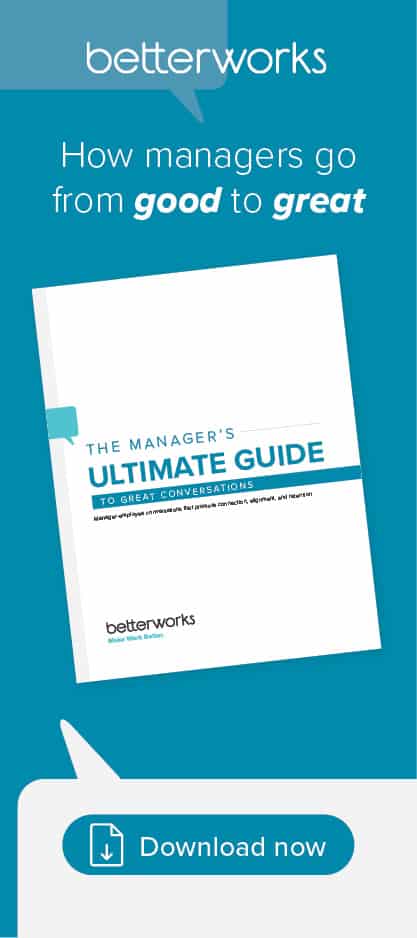Managers are among the most visible leaders in your organization, interacting regularly with front-line workers and business leaders alike. Great managers help their teams understand their goals, remove obstacles to peak performance, and help employees reach their potential. Because they’re so pivotal to the business, improving manager effectiveness is the top priority for HR leaders today.
That’s because manager effectiveness is directly related to some of your most important business priorities, including retention and performance management. Nearly half (49%) of employees we surveyed for our 2023 State of Performance Enablement report, for example, have considered leaving a job because their manager was ineffective at providing feedback or conducting reviews.
Discover why you need effective managers, how you can improve their impact, and how HR can support managers’ goals.
The importance of manager effectiveness in the workplace
The manager’s role is a critical one: Guiding their teams to successful outcomes, driving business value, and empowering team members to pursue their career goals. They oversee the goal-setting process, provide direction for improving performance, and create an environment where employees feel supported and can reach their full potential.
Successful managers practice active listening and use emotional intelligence to recognize each team member’s interests and potential. Then, they align each employee’s aptitude with tasks that move the business strategy forward. They foster purpose and meaning for employees while increasing the team’s value to the business.
While great managers unify their teams and elevate each person, bad managers put the team’s goals at risk. Poor management hurts the business, too, because you’re less likely to retain good employees if they feel they have bad managers, driving up costs associated with hiring and training talent.
Benefits of effective management
Managers influence their teams, and that cumulatively impacts the entire workforce. Here are a few ways effective managers can improve business outcomes by supporting employees.
The impact of managers on employee engagement
Good managers foster an environment where employees feel motivated and inspired to do their best work. They create a culture of trust and respect by providing employee recognition and feedback, setting clear expectations, and offering support and guidance.
When team members trust that their managers have their best interests at heart, they feel more confident asking them for help and raising concerns early, before they affect performance. This is backed up in research, such as Gallup’s longstanding finding that managers drive 70% of the variance in their team’s engagement.
The impact of managers on productivity
Increased employee engagement is itself a driver of productivity. But effective managers also spur better work by giving employees the support and resources needed to get things done and hit their goals.
Feedback is another way managers help employees perform better, either by noticing and reinforcing positive behaviors or by identifying areas of improvement. Effective managers give feedback to employees in real time and during regular check-in to help them learn in the flow of work.
4 common challenges faced by managers
HR leaders need to provide the right conditions for managers to be effective in their roles. Learn more about four of the most common barriers to success faced by managers.
Lack of time and resources
Managers need support from HR to be successful. Yet, according to our State of Performance Enablement report, only 24% of managers feel they always get that support. When managers feel under-resourced or short on time, they struggle to support their team in meaningful ways. In turn, employees feel unsupported, which can lead to lower morale, frustration, and worse outcomes.
If a manager delegates a task but doesn’t have time to help them understand what to do, the employee is less likely to succeed. By contrast, when managers effectively delegate by providing the resources and knowledge the employee needs, they improve outcomes for the deliverable and support their team member’s professional development.
Communication issues
Poor communication leads to misunderstandings, confusion, and lower productivity. When managers can’t clearly communicate their expectations and instructions to employees, the whole team is affected — and so is their quality of work.
Miscommunication creates distrust and tension within the team and between managers and their reports. If a manager can’t communicate what’s most important for the team to accomplish, for instance, employees may feel lost or spend too much time on the wrong tasks.
Resistance to change
Managers are a crucial component of organizational change and transformation efforts. While high-level alignment is where change starts, managers make change a reality. Cutting managers out of these efforts makes it harder for them to lead their teams through change. And when employees resist change, managers are less effective and likely to feel discouraged and disengaged.
If your company is revamping its performance management processes, for example, this change directly affects each team’s habits and behaviors. Resistance is likely, especially if employees don’t see why they should adapt. Managers are caught in the middle, trying to adjust to the change themselves while also helping their team understand its purpose and benefits.
Little or no leadership training
Many managers don’t feel like they have the training or leadership skills to be effective leaders of high-performance teams. Strong performers are often promoted to management positions based on their individual performance. While they might have leadership potential, they’re thrown into positions of authority without the backing needed.
Without understanding the fundamentals of leadership, such as how to communicate, motivate, and solve problems, these managers will struggle to effectively lead their teams and collaborate with their peers.
Managers today are called upon to be coaches, not just leaders. Yet our 2023 State of Performance Enablement report suggests only 54% of managers feel confident delivering career development and coaching to their teams. Managers who feel unprepared and unsupported by the organization are less likely to be effective in the role.

4 tips for improving manager effectiveness
HR leaders have a powerful opportunity to train and develop managers in their organization. Learn more about these four tips for managers to become more effective.
Support effective communication
Strong communicators set clear expectations and consistently share timely and important information with their teams. These managers learn about each employee’s needs and help tailor development plans to improve performance, achieve professional goals, and drive job satisfaction.
The Manager’s Ultimate Guide to Great Conversations offers detailed guidance on how to create and maintain positive and effective relationships with employees. One key aspect is having conversations that provide clarity, connection, and trust. Regular meetings between managers and employees are essential, but they should also have a consistent process for documenting performance, achievements, development, and recognition.
HR plays an important role in team communication by providing resources to help facilitate better conversations. Manager and employee discussions take on more meaning and provide greater value when both parties have a set of relevant and repeatable question templates they can apply to their conversations.
Set clear expectations
Managers who understand what’s expected of them and their team can better organize their time and resources — and help their teams do the same. Goal alignment software helps managers visualize and analyze their team’s role in executing the business strategy, while employees can see what they’re accountable for accomplishing.
When goals are clear, talking about performance is easier because the manager and employee have a shared point of reference and are tracking progress the same way. By setting clear expectations, managers can have targeted discussions that help employees adjust and improve their performance in real time.
Develop and coach employees
Coaching helps managers identify the strengths and weaknesses of each employee and use that knowledge to guide performance and productivity. Coaching also helps managers identify their reports who have the most potential for management roles themselves.
Traditionally, most employees are promoted because they’re strong individual performers. But being good at a job doesn’t necessarily mean you’ll be good at managing other people and their workloads — and many star performers don’t want to manage people. When HR leaders support managers in coaching and developing their employees, you’ll not only have better managers, you’ll also nurture the next generation of leaders.
Provide continuous learning and improvement
No one can afford to stagnate in today’s environment. All employees need to regularly identify learning opportunities, seek out new skills, and improve their processes. This is especially important for managers who want to be better leaders and coaches.
By developing a growth mindset and constantly seeking improvement, managers can stay motivated and become more effective in their role. HR leaders can provide robust learning and development opportunities to help these managers pinpoint areas to work on.

3 best tools and resources for improving management effectiveness
Many of the tools and programs you’ve implemented as part of your talent strategy also support manager effectiveness. Consider how you can use these resources to help your managers become more successful in the role.
Performance management software
Performance management software helps managers track progress, set team and individual goals, and provide feedback in a timely manner. This software provides managers with an easy-to-use platform for creating development plans and coaching employees.
Performance management software doesn’t just collect data; it also offers a variety of reporting options so managers can analyze performance data and respond accordingly. The result is managers who are better informed about employee performance so they can offer data-driven guidance and feedback in real time.
Training and development programs
Formal training and development programs support long-term professional growth. Performance management software helps managers see where they’re performing well and where they might need improvement, new skills, or simply a refresher course. From there, HR can help managers identify the courses, learning modules, or other activities best suited to their learning style. Go even further by providing on-the-job opportunities to apply their learning.
Coaching and mentoring programs
Just as good managers coach and mentor their employees, they also benefit from trusted advisors who help them navigate difficult situations and develop their leadership skills. HR leaders can help managers identify the ideal coaching or mentoring opportunities for each manager. Some managers benefit from a mentor within the organization, while others will benefit more from an outside coach.

Manager effectiveness drives organizational performance
High-performance organizations understand the pivotal role of managers in driving front-line performance and carrying out high-level strategic initiatives. With great managers, your employees thrive and grow with your organization. With poor managers, performance goes down, turnover goes up, and strategic initiatives stall.
HR drives manager effectiveness through the policies, processes, and programs they create around goal-setting, high-quality conversations, collaboration, and continuous learning. By empowering managers to become more effective, you create a healthy and productive workplace where everyone succeeds.










